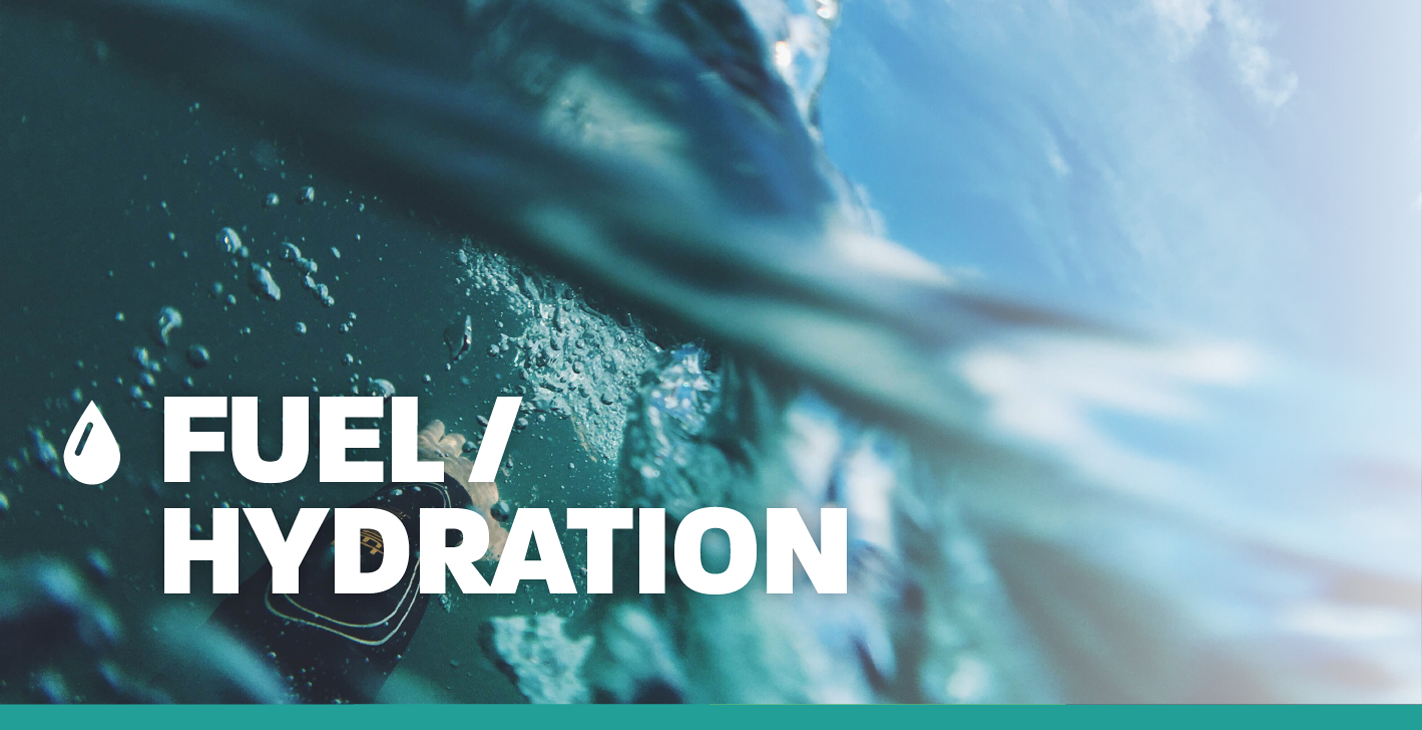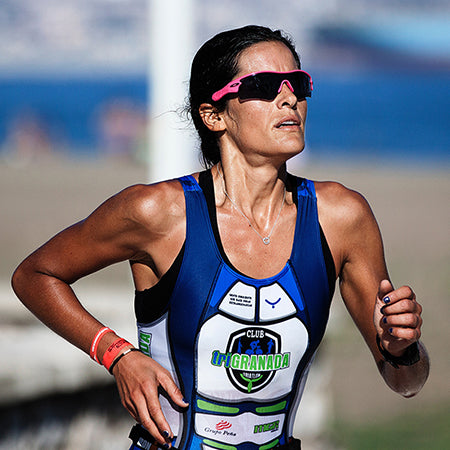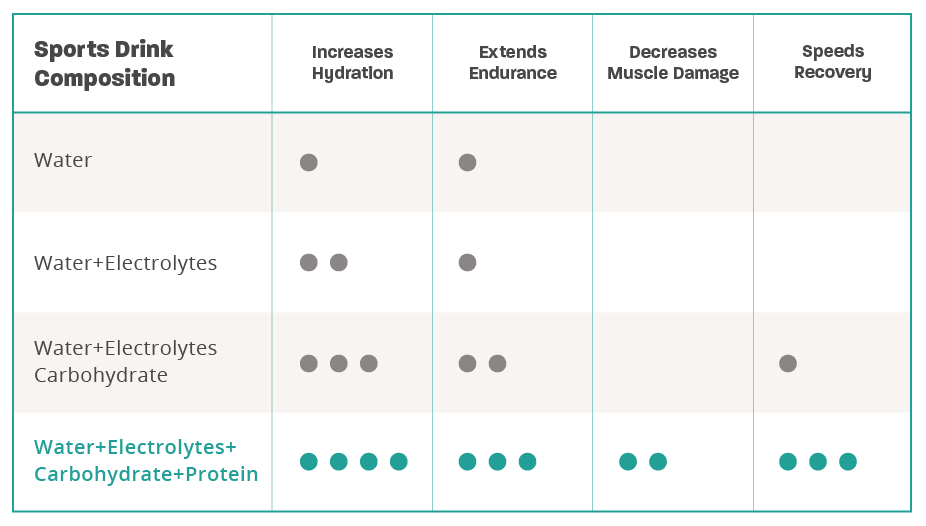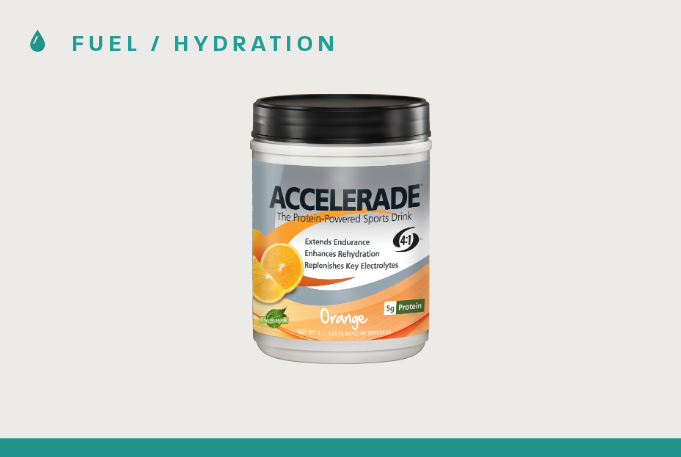FUEL/HYDRATION

The Cornerstone
Hydration is the cornerstone of any athlete’s regimen. Working muscles generate enormous amounts of heat. In fact, without any ability to cool, 25 minutes of hard exercise could bring your body temperature to 106°, which is a life-threatening temperature. To prevent this your body has developed a sophisticated system of cooling in which heat from muscles is transported to the surface of the skin, where it evaporates as sweat. The evaporation generates cooling.
In spite of the fact that so much is written about the importance of hydration, it is still often ignored by athletes. The effects of moderate dehydration are an increase in fatigue, an increase in heart rate, and a decrease in endurance performance. Severe dehydration can cause death.
It would seem that the simplest solution is to drink as much fluid as you lose. That is often difficult since your GI tract can only absorb so much fluid in a finite period of time. Much of the water that is consumed is not absorbed. The introduction of the first sports drink helped solve this problem.
By combining water with electrolytes, more water was absorbed. Additionally, the electrolytes in the drink maintained thirst to encourage an athlete to continue drinking. Although the first sports drink only contained electrolytes, it was soon noted that the addition of carbohydrate could further improve rehydration. The reason being that water absorption is dependent upon sodium transporters in the cell. Carbohydrate helps absorb sodium using a different sodium transporter. The net effect is a combination of carbohydrates and electrolytes produces a more complete rehydration than just electrolytes or water alone.

The carbohydrate added in the early sports drinks was shown to extend endurance by providing energy to working muscles. Although your muscles store energy in the form of glycogen, there is a limited amount of glycogen that can be stored. When this is depleted, an athlete bonks or hits the wall. Researchers noted that when carbohydrate was consumed in a sports drink, it had a sparing effect on muscle glycogen. In other words, the muscle glycogen was not depleted as rapidly. The result: greater endurance.
The carbohydrate-electrolyte sports drink remained the standard for almost 30 years. In spite of the many studies substantiating the benefits of carbohydrate and electrolytes during exercise, plain water is still the number one sports drink. And in a world in which we feel it is necessary to demonize nutrients, a number of electrolyte-only variations have been introduced. These no-sugar, no-carbohydrate products sound appealing since they appear consistent to many mainstream articles that detail the evils of carbohydrate.
However, no-sugar, no-carbohydrate products don’t take into account that our muscles have developed a sophisticated energy utilization system over hundreds of thousands of years, and the fuel for this system is simple sugar. Using water or a water-electrolyte combination and hoping to improve endurance would be analogous to putting water in your car engine because you don’t want to cause air pollution. Sounds good, but doesn’t work very well.

THE BREAKTHROUGH
The first major innovation in sports drinks in almost four decades was the introduction of a carbohydrate-protein electrolyte sports drink. The addition of carbohydrate and protein in a four-to-one ratio dramatically improved the benefits of sports drink consumption during exercise. The table below shows the impact of protein. Protein has an additive effect on hydration, an additive effect on endurance performance, and brought a unique benefit by reducing post-exercise muscle damage.
Protein has an additive effect on rehydration by activating a third sodium transport system. In studies comparing a carb-protein sports drink to water and a carb-electrolyte sports drink, investigators found the carb-protein sports drink was 15% more effective than the carb-only sports drink and 40% more effective than water in improving rehydration.
Added protein also extended endurance – more than 24% compared to a carbohydrate-only sports drink and 40% more than water. Protein added to a sports drink may delays the release of fatigue signals emanating from the brain. This translates to an increase in endurance.
The other major benefit of protein is a significant reduction in post-exercise muscle damage. During extended exercise of moderate to high-intensity, up to 20% of the muscle’s energy is derived from protein. This cannibalization of protein results in increased muscle damage, usually evidenced by elevation in markers of muscle damage. Protein greatly reduces the muscle damage, resulting in a faster, more complete recovery and a stronger workout in a subsequent exercise bout.




